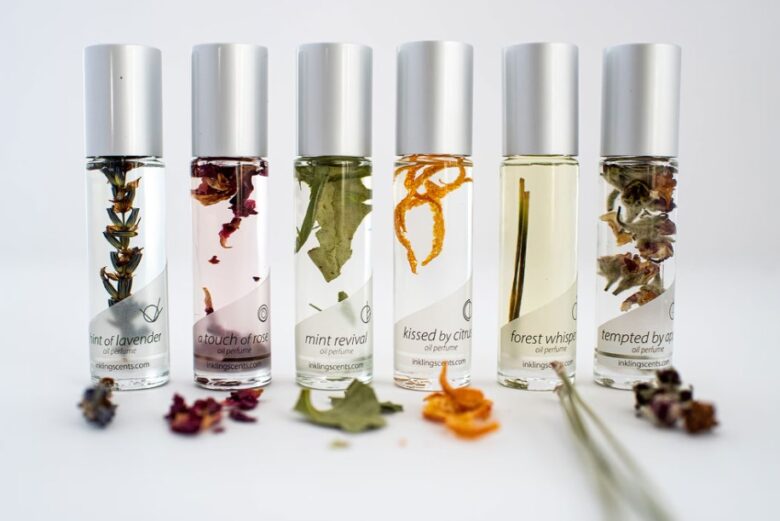When it comes to perfumes, there are two types of fragrances: essential oil perfumes and synthetic fragrances. Each type possesses its characteristics and advantages. In recent days, more people are increasing their consumption of essential oil perfumes due to many reasons. Essential oil perfumes are not only sustainable but provide a great variety of fragrances derived from natural sources.
On the other hand, synthetic perfumes contain phthalates, which might irritate sensitive skin during continuous usage. However, to make an informed choice. One needs to understand the basic difference between essential oil and synthetic fragrances.
In this blog post, we will explore the disparities between these options to assist you in making a choice regarding which one suits you best.
Contents
What are Essential Oil Perfumes?

Source: etsy.com
Essential oil perfumes are crafted using natural plant extracts. These oils are obtained from parts of plants such as flowers, leaves, stems, or roots. The extraction process involves either steaming or pressing the plant material to release its compounds. From the different organizations producing essential oil perfumes, one can try authentic Zoha fragrances. The organization has a great reputation in the market for manufacturing quality essential oil perfumes.
Benefits of Essential Oil Perfumes
- Natural and chemical-free ─ A significant advantage of oil perfumes is that they do not contain any synthetic chemicals or additives. They offer an option for individuals who prefer to avoid artificial ingredients.
- Aromatherapy benefits ─ Many essential oils utilized in perfumes possess properties and can provide aromatherapy benefits. For instance, lavender oil is renowned for its calming effects, while citrus oils, like lemon or orange, can uplift your mood.
- Distinctive scent profiles ─ Essential oil perfumes often have scent profiles because they contain a mix of aromatic compounds from plants that work together in harmony. This creates a nuanced fragrance experience compared to synthetic fragrances.
Things to Consider When Using Essential Oil Perfumes
- Sensitivity and allergies ─ While essential oils are generally safe when used properly, some people may have sensitivities or allergic reactions to oils. It’s important to perform a patch test with perfume products before applying them to your skin.
- Limited longevity ─ Essential oil perfumes typically don’t last as long as fragrances due to their volatile nature – they tend to evaporate more quickly once exposed to the air. Regular reapplication may be necessary throughout the day to maintain the scent.
What are Synthetic Fragrances?

Source: bloomingmandala.com.au
Synthetic fragrances, on the other hand, are composed of synthesized aromatic compounds. These compounds can be derived from sources like petroleum or coal tar.
Advantages of Synthetic Fragrances
- Wide range of options ─ Synthetic fragrances offer possibilities when it comes to scents because different chemicals can be combined in precise proportions, allowing for consistent replication of specific aromas.
- Increased longevity ─ In comparison to oil perfumes, synthetic fragrances tend to last on the skin due to their more stable composition. They are often favored by individuals who desire a fragrance that lingers throughout the day without the need for reapplication.
Factors to Consider When Using Synthetic Fragrances
- Potential health considerations ─ Certain synthetic fragrances may contain ingredients that could pose health risks for individuals. For instance, some chemicals found in fragrances have been linked to skin irritation, reactions, and, in some cases, disruption of hormones.
- Environmental impact ─ The process of producing and disposing of fragrances can have implications due to their utilization of petrochemicals or other potentially harmful substances.
Regulation and Labeling

Source: samparfums.es
Fragrances touch our lives daily, making the role of regulatory bodies paramount in ensuring our safety. These entities oversee ingredient safety, advertising claims, and more. Surprisingly, regulations can vary vastly, from stringent European Union standards to the relatively lenient ones in other regions. For the conscious consumer, keenly observing product labels is key. Symbols or certifications indicating ‘natural’ or ‘synthetic’ ingredients can be enlightening. Always cross-reference with recognized databases to determine the authenticity of these labels.
Sustainability
While a fragrance’s allure is undeniable, its environmental footprint might be less enchanting. Extracting essential oils, for instance, can consume vast amounts of plant material, leading to deforestation or habitat destruction. Conversely, producing synthetic fragrances might emit harmful by-products. However, a whiff of hope exists! Brands are increasingly adopting eco-friendly practices, from sustainable sourcing to biodegradable packaging. Supporting such brands can ensure you smell good, ethically.
Personal Preferences
Our choice of fragrance often goes beyond mere olfactory satisfaction. Cultural norms, societal trends, and even personal memories play roles in shaping our preferences. For instance, the floral notes cherished in the East might differ from the musky undertones preferred in the West. Moreover, a whiff of vanilla might transport someone back to their grandmother’s kitchen. Acknowledging these facets helps us appreciate the profound impact fragrances have on our psyche.
Combination Fragrances

Source: thestatesman.com
Delving deeper into the aromatic realm, we discover blends harmonizing both essential oils and synthetics. This amalgamation captures nature’s essence while leveraging the longevity and consistency synthetic compounds offer. So, when your fragrance lingers impressively long, know that it’s the symphony of nature and science at play.
Ethical Sourcing
Ethical sourcing in essential oils ensures sustainable and fair practices, benefiting both nature and producers. Consumers can bolster this by choosing brands committed to fair trade and environmentally conscious sourcing, thus promoting ethical integrity in the industry.
Making Your Decision
Ultimately, choosing between oil perfumes and synthetic fragrances depends on preference and specific needs. If you value ingredients and the benefits of aromatherapy, essential oil perfumes might be the choice for you. Conversely, if longevity and a broader range of scents are your priorities, you may lean towards fragrances.
Conclusion
Whether you opt for an oil perfume or a synthetic fragrance hinges on what factors hold importance for you – whether it is a natural scent with potential therapeutic effects or a longer-lasting aroma with precise replication possibilities.
By having an understanding of the distinctions between oils and synthetic fragrances, you can make informed choices when selecting a scent that aligns with your lifestyle and personal preferences.
